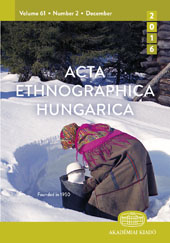Staging Ethnicity: Cultural Politics and Musical Practices of Roma Performers in Budapest
Staging Ethnicity: Cultural Politics and Musical Practices of Roma Performers in Budapest
Author(s): Gergő PulaySubject(s): Politics, Fine Arts / Performing Arts, Music, Cultural Anthropology / Ethnology, Ethnic Minorities Studies, Identity of Collectives
Published by: Akadémiai Kiadó
Keywords: cultural politics; performance; Roma representation; world music; recognition; modernity; ethnic marketing;
Summary/Abstract: During the last two decades Roma musical styles have gone through numerous changes in Central and Eastern Europe. The effects of these cannot be assessed merely through changing musical performances and products in themselves, they must also be seen through the ways the Roma shape their relationships with their broader social surroundings. In spite of this, music-making is often considered as marginal compared to the mainstream issues of Roma research, justified by oppositions such as the one between the ‘sunny side’ of cultural creativity and the ‘gloomy side’ of everyday life in Roma communities. This view can be supported by some of the academic accounts that depict Roma performers as ‘apolitical’ subjects who are closer to the members of the majority – in the role of service-providers – than to their own co-ethnics. This paper introduces a case that counters these assumptions. Based on the heritage of the Roma cultural movement in Hungary, Roma performers and their practices of music-making were placed in direct association with the struggles for recognition in post-socialism. Especially from the 2000s on, these musical and discursive resources were deployed by Roma performers in their project to create a music scene and a niche market in the subcultural landscape of Budapest. Through their participation in this market, Roma performers had been engaging with the micropolitics of recognition and social participation. The liminal space defined by musical events determined both the possibilities and the limits of the experiments in which Roma performers and their mixed Roma and non-Roma Hungarian audiences were involved. The paper discusses the development of this niche, including the content, the politics and the space of musical performance.
Journal: Acta Ethnographica Hungarica
- Issue Year: 59/2014
- Issue No: 1
- Page Range: 3-24
- Page Count: 22
- Language: English
- Content File-PDF

